






















What does a woman veteran look like? In this publication, you will get a glimpse into the lives of 10 women veterans: different branches, different responsibilities, yet similar experiences regarding the impact the military made on their lives during service –and since.
Those profiled have shared the benefits of their service as well as the challenges. The opportunities for education and training – common reasons for why many enlisted – have served them well, as each woman veteran has continued to serve beyond the military in myriad ways: teaching, helping others navigate mental health, aiding veterans through the transition after military service, educating youth, inspiring positive growth in communities, and so much more.
With more than 2 million living female veterans in the U.S., according to a 2021 publication by the U.S. Department of Veterans Affairs, it’s time to recognize and honor their contributions. Building awareness and supporting women veterans has become a focus of William Chandler Peterson American Legion Post 171, especially after the post learned that the population is 250 percent more likely to attempt suicide than women who have not served.
The leadership of Post 171 is supporting a team of women veterans to launch a local chapter of SheForce, a safe network for women veterans to meet and connect in a positive environment with a focus on whole health.
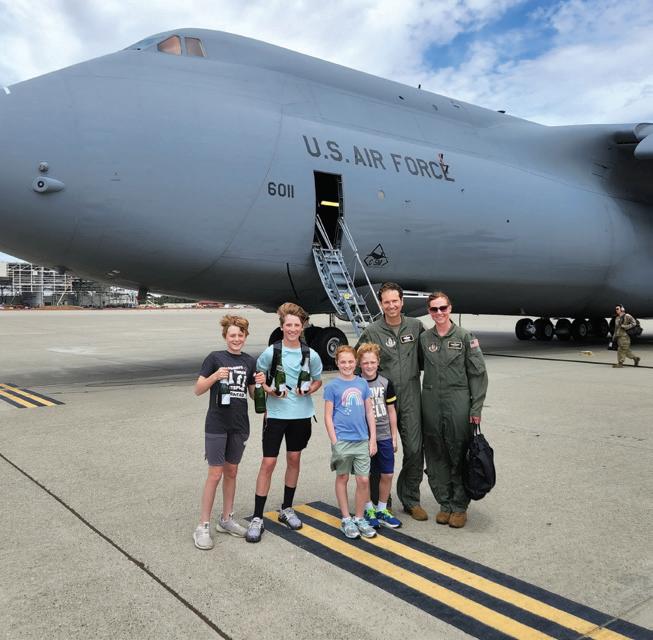
SheForce was founded in 2012 by Donna Allen Rielage, who recognized the need for segregation of women veterans for health and fitness programs. Rielage – who also started AllenForce, the umbrella 501c3
organization – structured SheForce to empower women in health and wellness with tools to build self-esteem and allow individuals to find their voice.




Women veterans connecting through SheForce can bring out their natural feminine energy and let it shine, Rielage says. Military training often requires women to abandon their feminine side. SheForce support encourages women veterans to embrace their femininity in a safe and rejuvenating environment.
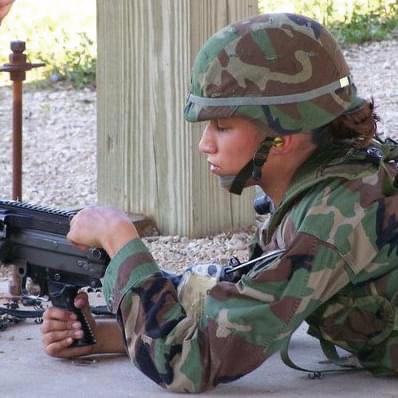
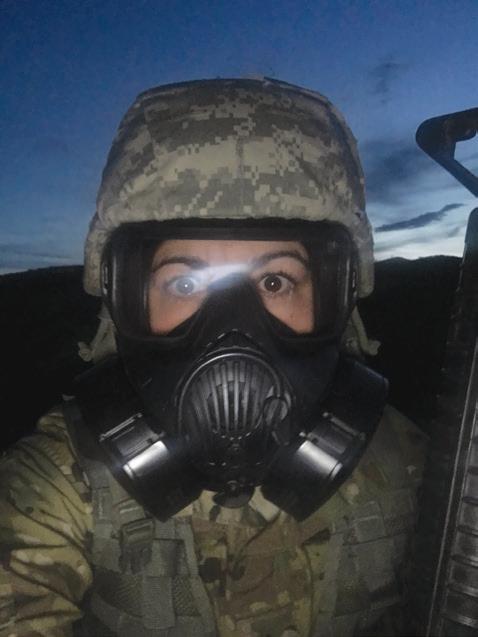

The first Northern Illinois SheForce meeting will be January 6, 2024 at The Community Foundation for McHenry County on Woodstock Street in Crystal Lake, Ill. The meetings will allow women veterans to be open to converse on life, trauma, and physical and mental health.
To learn more about the new chapter of SheForce Northern Illinois contact Nicole Eisenrich at neisenrich@ nisra.org, or Donna Rasmussen at drasmussen@ illinoiscccs.org.
William Chandler Peterson American Legion Post 171 would like to continue to identify and celebrate women veterans in our community in future years. If you know a woman, or are a woman who served, please visit our website below to be considered for a future publication.
May all the women veterans not included in this publication feel our gratitude for their service to our country and our communities.
Thank you to ALL our women veterans, William Chandler Peterson American Legion Post 171 www.LegionCrystalLake171.org
Branch: Army, Army National Guard
2001 - 2023
Rank: Sergeant First Class, E-7

Home: Prairie Grove
Age: 40
When a recruiter mentioned “free college” to 18-year-old Sandra Contreras, she jumped at the opportunity, not realizing until boot camp exactly what she had signed up for.
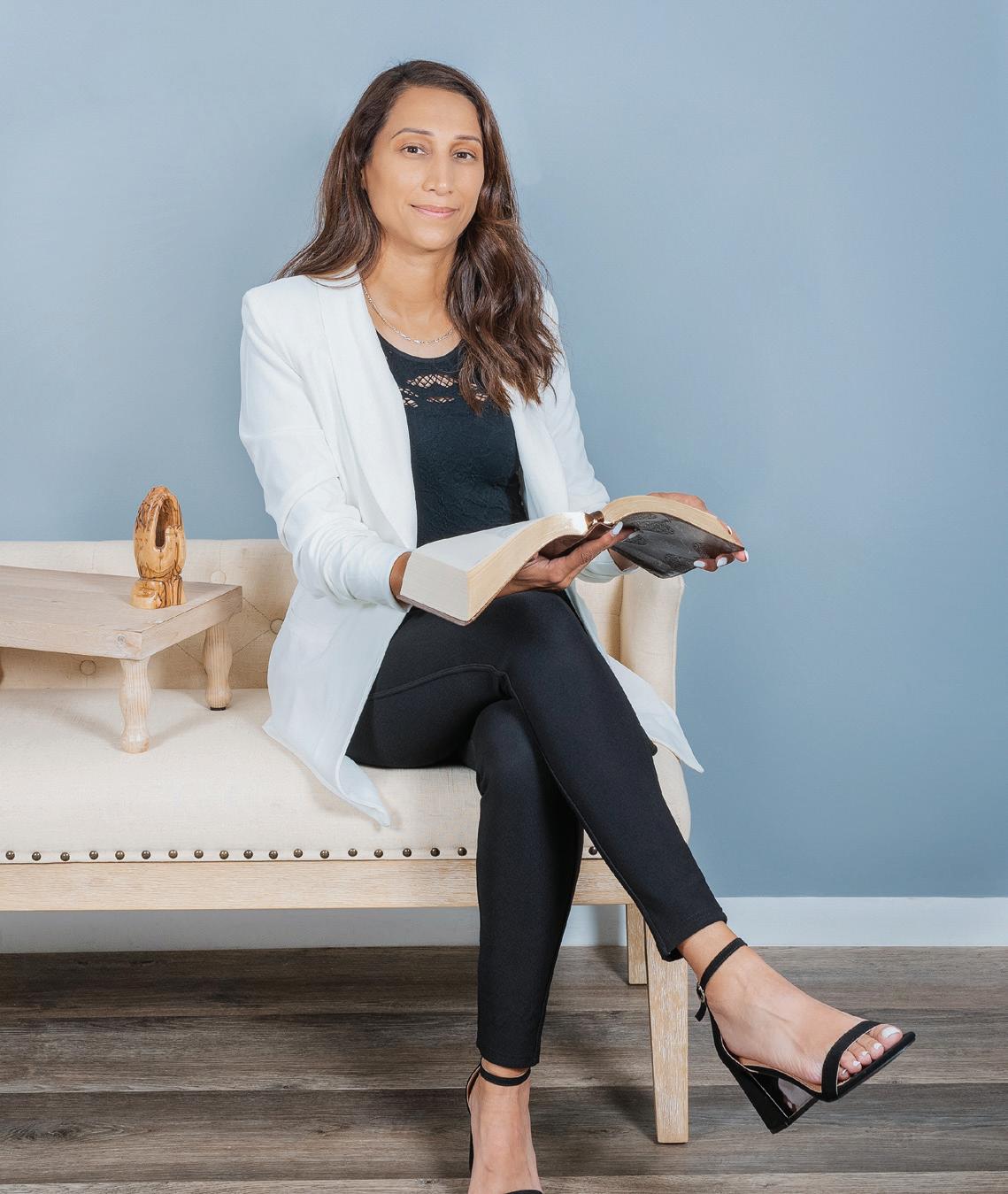
“I told myself, I’m going to graduate high school, I’m going to succeed, I’m not going to be the statistic of the Chicago Little Village Hispanic who didn’t graduate and didn’t do anything with her life,” she says.
“Honestly, I really, really enjoyed it, and I loved the camaraderie you got out of it,” she says. “I always wanted to be successful in some way, and I think it brought out the best of me. But I thought my identity and my purpose was the military until recently. The military is not who I am. It’s part of my life, and it’s part of my story, but it’s not who I am.”
For years, Sandra was a very successful recruiter because she believed in her mission so strongly.
But when a female close to her – one she recruited – was sexually assaulted during boot camp, Sandra started
doubting her mission. Suppressed memories of her own military traumas resurfaced.
It took two years for Sandra to disentangle her good military experiences from the bad and to decide to leave her 22-year career. She feared getting out because she didn’t know who she was without the Army.
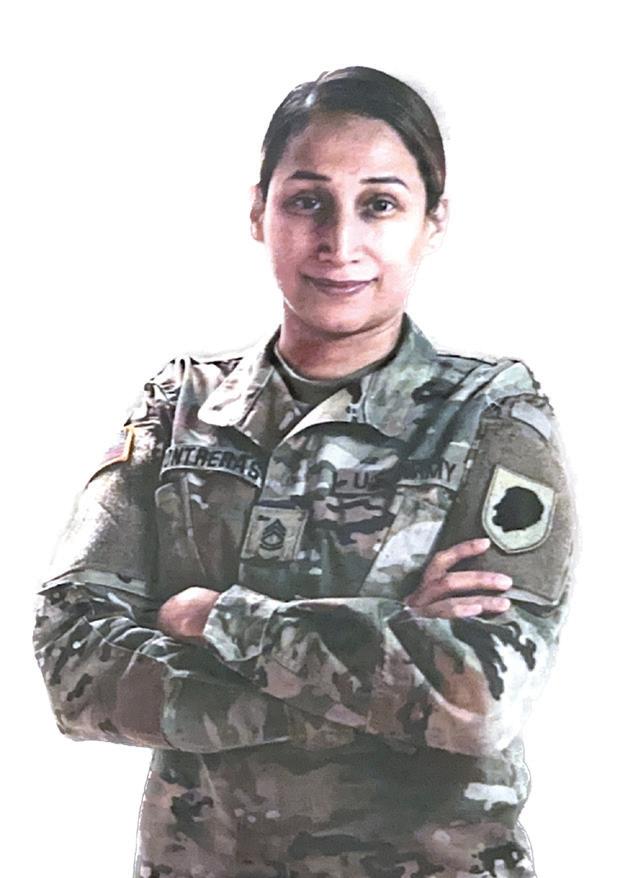
“It was hard,” she says. “I love it so much … but I’m so happy I got out, because now I am finding who am I and taking my military experience as an experience that helped me to mold my character and help me find who I am, but not BE who I am.”
Today, Sandra and her husband, Julio, also a veteran, run three nonprofit organizations: Harv War Bangerz Boxing Club, which works closely with veterans to mentor inner city kids and train them to become amateur and professional boxers; A.G.A.P.E. Chicago 773, a faith-based nonprofit that stands for A Generation Assisting People Everywhere; and an online thrift store, A.G.A.P.E. Chicago Retail Shop, which funds the endeavors of A.G.A.P.E.
“I want to leave a legacy for my kids to build upon,” Sandra says, noting her four children are very involved in her nonprofits. “We’re helping the homeless, single mothers, teen moms, disabled children, inner city kids, drug addicts, burn victims, sexual assault victims, veterans – because I –and members of my family – have experienced all of that.”
Lori Boyle had just turned 18 when she enlisted in the Marine Corps.
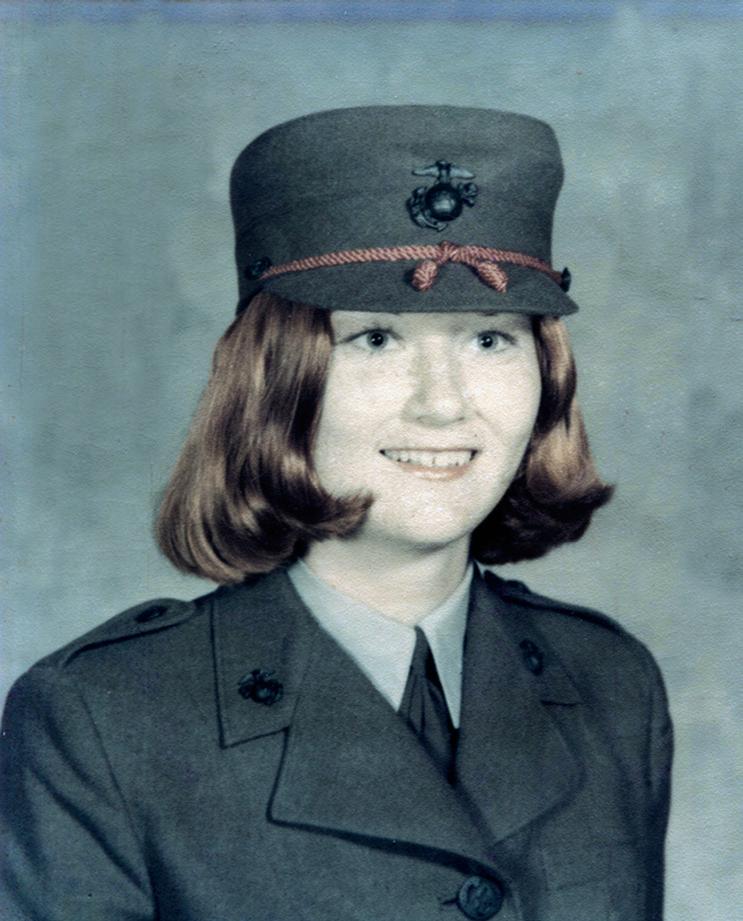
At the time, she wasn’t collegebound, and she wanted out of Hoffman Estates.
But her military experience became much more than an escape. There was “camaraderie, discipline, a lot of fellowship, teamwork, patriotism … I learned so much,” she says.
“When I was in, Vietnam had just ended, and I had a lot of those old Marines I had to deal with who didn’t think women belonged in the military,” she recalls. “It was a struggle with some of the men. But on the other hand, I had a lot of big brothers who taught me how to work on my 1963 Ford Falcon.”
Lori was in motor transport and drove anything from ambulances to tractor trailers to dump trucks. She also was a member of the All-Marines’ softball team, and she traveled the country representing the Marine Corps against the other service branches.
But whether she was at Camp Lejeune in North Carolina, or Camp Smith in Hawaii, she worked hard and was there for a purpose – one she wishes others understood.
Branch: Marines, 1976 to 1980
Rank: Corporal, E-4


Home: Wonder Lake
Age: 65
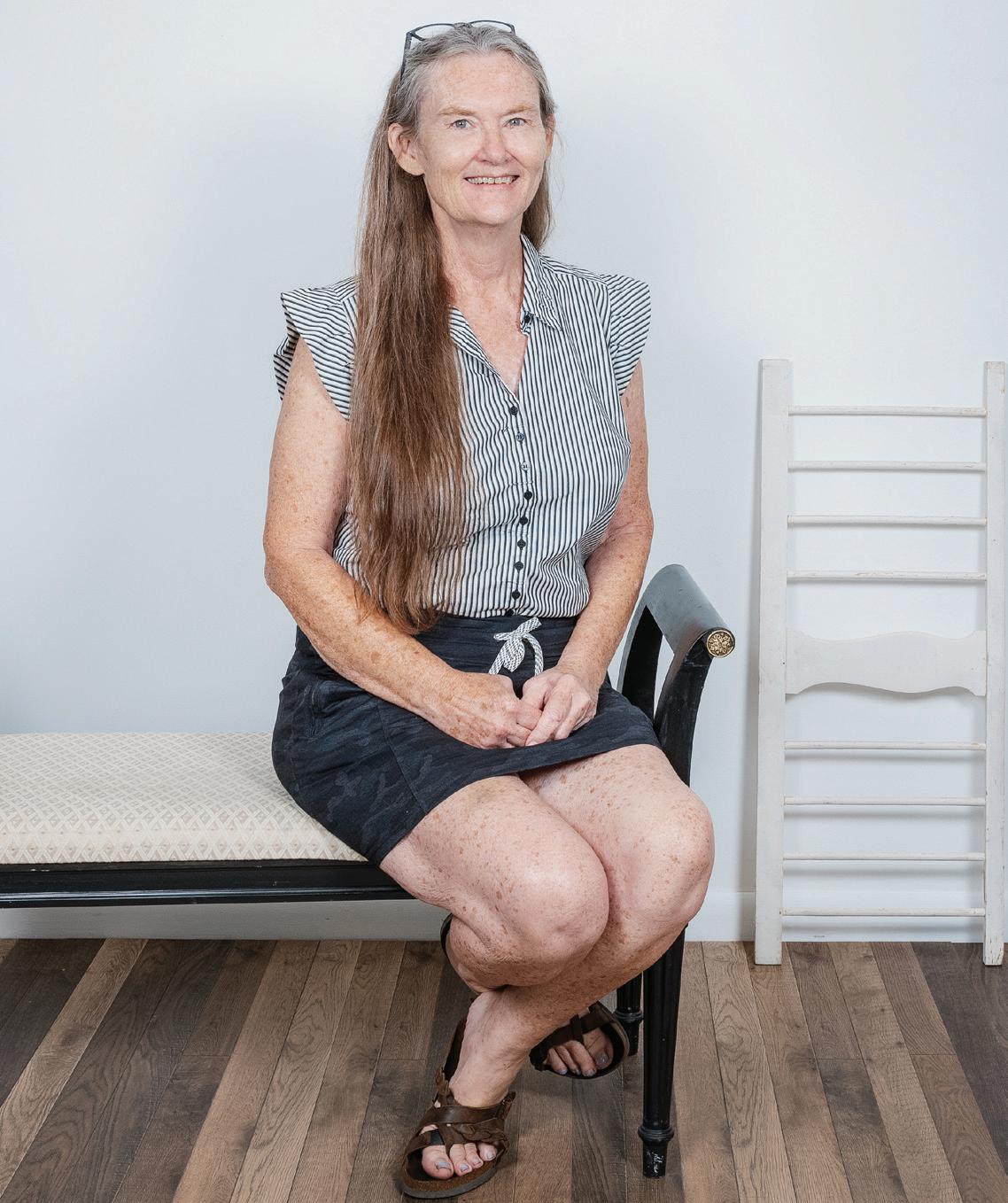
“There’s a kind of ignorance I had to fight when I was in the Marine Corps, and still now,” she says. “Women don’t go in there to service the men. We go there to do a job and work alongside the men as a team. We are by no means tramps.
“We’re hard workers,” she added. “We may not be as strong physically as men, but we bring strength in other ways. We are strong, and I believe we become stronger while in the military. The biggest thing I learned was to stand up for myself. I became stronger and more confident. The Marine Corps tag line was, ‘we need a few good men.’ They needed a few good women, as well, because we work as a team.”
Lori used her confidence and skill sets to launch her own graphic design company, which she’s finally closing after more than 20 years. But she will continue to provide pro bono graphic design work to Trinity Baptist Community Church in Crystal Lake, the Marine Corps League, Veterans Path to Hope and other organizations. Currently, she is a board member of Veterans Path to Hope.
Lori is married to Bill, she has one son, three stepdaughters, four grandchildren and two dogs.
Branch: Army Reserve, 1985 - 1993

Rank: Medevac
Home: Algonquin
Age: 56
Nirda Derose never thought she’d go to war.
That’s the only reason that, at 17, her father signed his permission to allow her to join the Army Reserve, which she thought sounded exciting.
Nirda was already heading to Miami for college, but a few choice words from a recruiter – “it’s a chance to help people” – convinced her the reserve was a good idea.
“That’s why I chose to become a medic, because you didn’t have to go to war to use your skills,” she says.
But in 1990, Nirda WAS deployed, and she served during the Gulf War flying in Hueys.
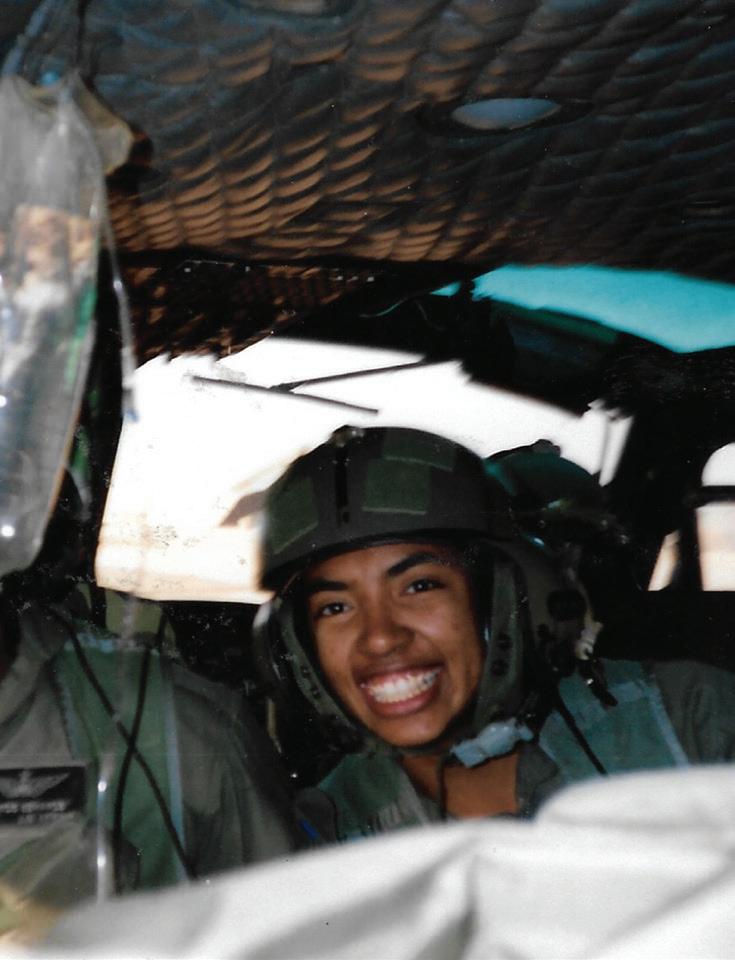
“I get mad when some reservists say [they] didn’t do much [in the Army Reserve],” she says. “Sorry, speak for yourself: as a reservist in the medical field, we trained and we trained hard, because we knew if we were called up to war, this was nothing to play with.
“In addition to our weekend a month and our weeks during the summer … we had to put in flight hours, sometimes once a week, or every other week,” she
continues. “As a medic, we had to log hours just like pilots. I earned my wings … because we had to be trained to be second pair of eyes for the pilots. We’re not flying with oxygen; we’re flying with the doors wide open.”
While some downplay the reserve, Nirda says her experience proves everyone who signs up to serve plays an integral role in the protection of our country.
And women have always had a place in that protection.
“We know we are in a very small percentage,” she says. “But others should think about all the women who served, even from the Civil War – the nurses, even though they didn’t get credit – people should know that women have been serving in some capacity since war has been around.”
Nirda has spent the last 30 years teaching – she’s currently instructing Barrington third graders – and says the skills she learned decades ago still play a role in her day-to-day life.
“Leadership skills, communication, problem solving, teamwork – I had to learn all those things in the military,” she says. “Conflict resolution, flexibility, management skills … we carry all of that into our civilian life, and we continue to serve in many different capacities: as teachers, as businesswomen, as doctors, as nurses.”
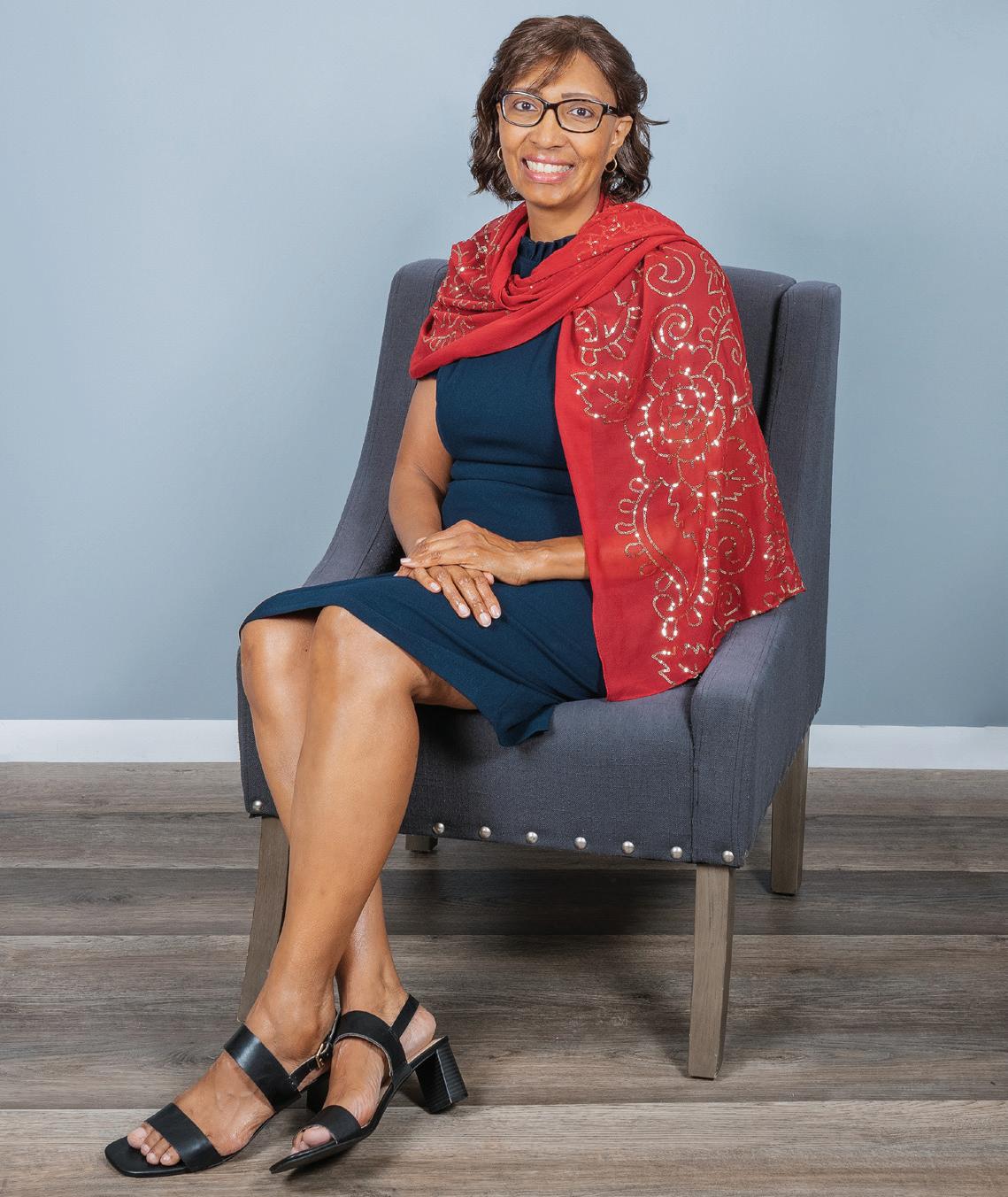
For Quinette Hobson-Robb, joining the military was a way out.
The combat veteran hails from a small, low-income town in central Illinois, population 300.
“A lot of people didn’t go to college,” Quinette says. “There’s a lot of addiction, drug use … you’re born here, you’re raised here, you live here, you die here. I always felt this draw that the world is so much bigger than this tiny little place in middle America, and I really wanted an opportunity to get out and explore.”
Quinette completed her basic training between her junior and senior year of high school and ended up loving it, she says. She deployed in support of Operation Iraqi Freedom in 2008 and ’09 doing long-haul trucking missions, and she stayed on even after having children.
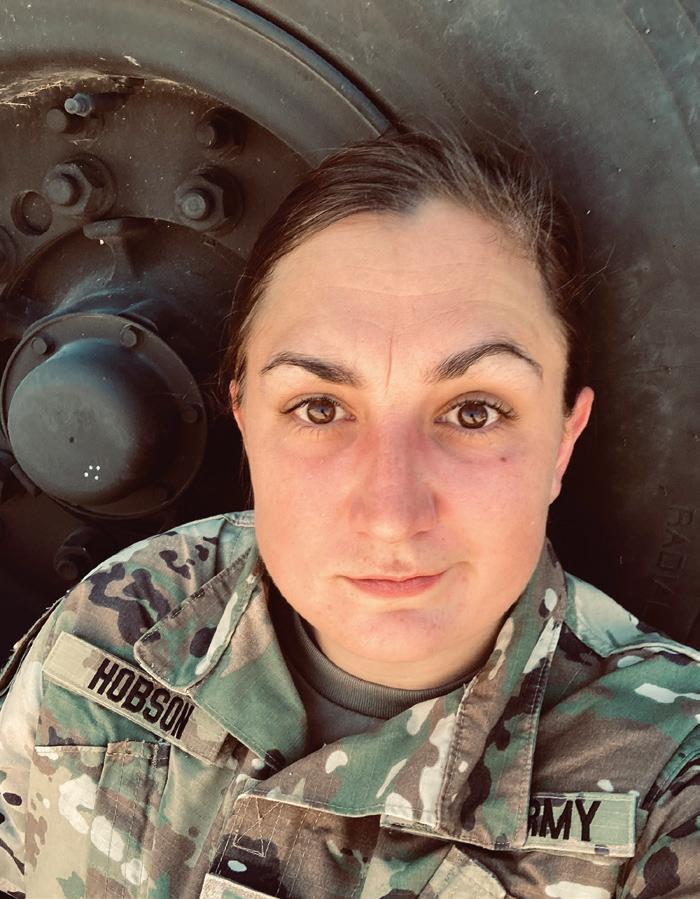

“As my parents always said, the only time they ever saw a twinkle in my eye was while serving,” she says.
Even now, Quinette is grateful for the experiences the military gave her.
“It opened my mind that it’s very conservative, racist, where I come from, and having the opportunity to serve with so many different types of people, different colors of people, people from so many different backgrounds, it
Branch: Illinois Army National Guard
2006 - 2021
Rank: Sergeant, E-5

Home: Algonquin
Age:
really opened my eyes that people are so much more than the labels or the things that you can be brought up [being taught],” she says.
Education was another plus, and Quinette earned her bachelor’s and master’s degrees in social work, which she used while employed with Veterans Path to Hope and continues to use in her role as the compliance and quality assurance analyst for the McHenry County Mental Health Board.
“There’s no way I could have [gotten my degrees] without the benefits from serving,” she says. “So, lots of doors were opened.”
Sometimes reservists get the undeserved reputation of being “weekend warriors,” she says.
“But in the National Guard, you are balancing your military commitments, you’re trying to hold a full-time job, [you have a] family, sometimes [you’re] going to college – and at one point, I was doing all of those things,” she says. “It’s a lot of spinning plates. But the National Guard trained me for everything.”
Quinette and her husband have three children and a dog.
Branch: Air Force, Air Force Reserve
2001 - 2022
Rank: Lieutenant Colonel

Home: Prairie Grove
Age:
Shawn Lowe didn’t grow up military bound.
But after 21 years in the Air Force and Air Force Reserve, she’s passionate about sharing the advantages of the service.
Last year, she spent a day with high school parents explaining options for their students: the military academy, the reserve or active duty.
“I think that more people would benefit from being a part of it – even two to three years – than not,” says the Island Lake native. “Not only would they benefit, they would have something to offer. I feel like there’s a lot of high school and college students that could go down that path and find some enjoyment and fulfillment and benefit from joining, but they don’t know that it exists.”
Shawn’s military career came about almost by happenstance.
“When I was finishing up high school, I wasn’t really sure what I wanted to do,” she remembers. “The University of Illinois had an aviation program at the time, so I flew through college, and I didn’t think I wanted to join the military. But as senior year was coming to a close, I didn’t feel enthusiastic about becoming an airline pilot.”
She joined active duty as a pilot after college, finished Officer Training School … and found her niche.

“I like flying. It’s what I did, what I knew, what I liked,” she says. “When you’re an airline pilot, you fly, do your thing, go home. But when you’re in the military, you’re also managing and taking care of people. So, it’s kind of like you have two jobs. I liked that I was a flight instructor, helping new people become pilots. But also I was … helping mentor them through their career, and those aspects of the job I enjoyed, so I stayed in longer.”
Shawn finds herself grateful for the places she visited, even if it wasn’t in a tourist capacity.
“My airplane wasn’t just combat support,” she says. “A lot of humanitarian aid would come from the large cargo airplanes, which is what I flew.”
She’s proud of her service – and that of her husband, Ryan, also an Air Force pilot – though she notes not everyone gives women veterans proper consideration.
“There are more female veterans than people realize,” says the mother of four. “The assumption that it is the male or husband who has served rather than the female or both of them is short-sighted.”
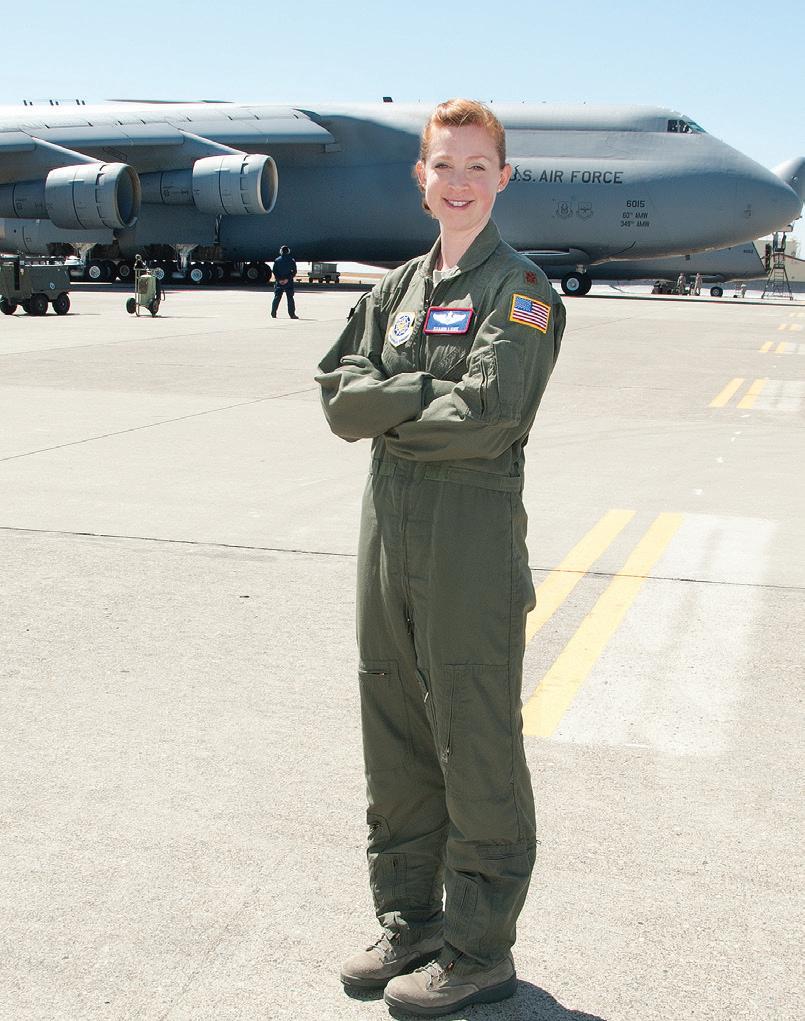
When Deb Mallery and her second husband married and applied to put their house loan in both of their names, all correspondence was addressed to Mr. Mallery, with a “Thank you, sir, for your service.”
Everyone assumed their VA loan came from her husband’s military service – even though he never served, Deb says.
“I don’t think we’re very recognized at all,” she says of female veterans. “It’s a male-dominated world.”
After spending 15 years as a certified surgery technician, Deb recently found her place as a peer specialist at Veterans Path to Hope in Crystal Lake, and it’s brought healing to her soul.
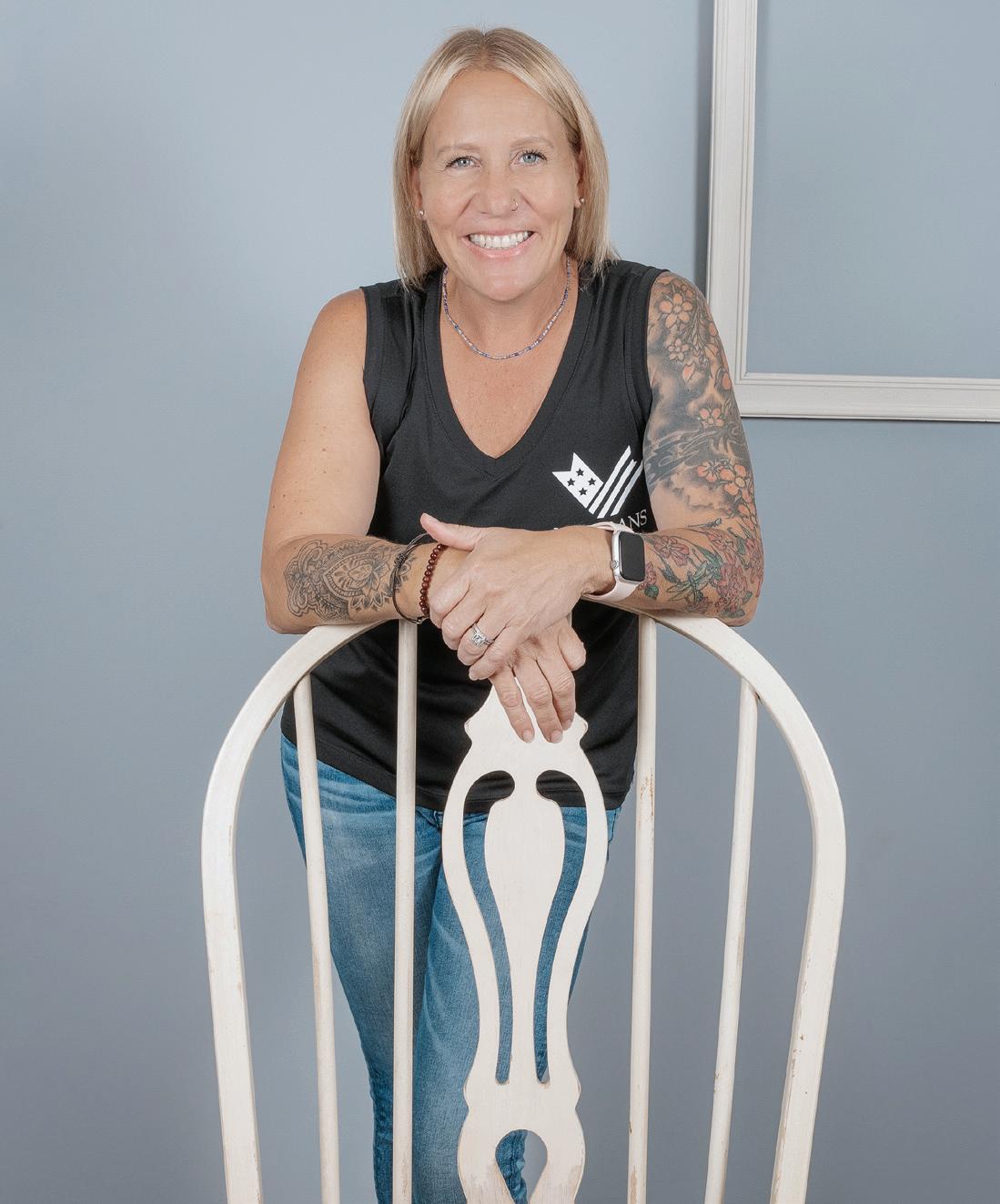
“I love that I’m helping vets now, but I can’t say being a female in the ’90s in the Navy was a great place to be,” she says. “I give mad props to women in the service. I have huge respect. They’re tough, they’re resilient – you have to be.”
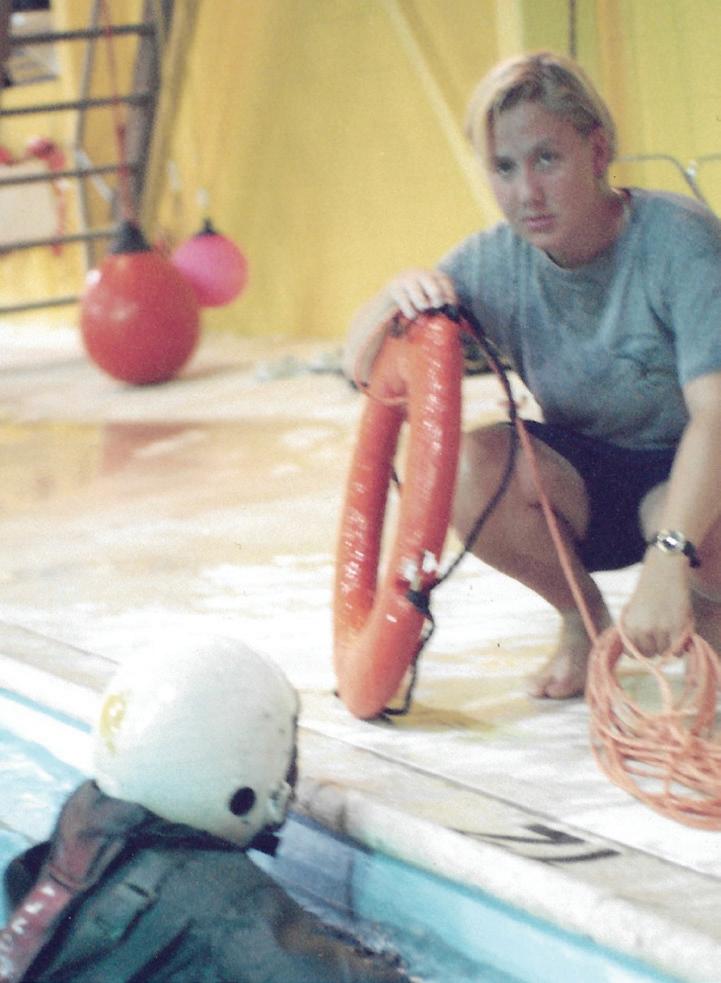
Today, “Mama Bear” – as she’s known around the center – is the first person veterans see when they walk in the door at Veterans Path to Hope. She explains what services are available, whether it be job, housing or food assistance; counseling; or an invitation to veteran social groups.
Branch: Navy and Naval Reserve


1993 - 2001
Rank: Yeoman, E-4
Home: Woodstock
Age: 49
“It’s just really helpful because we’re all vets, and vets understand vets much better,” says the mother of two. “It is a different universe, a different world, to be in the service. It’s not like civilian life. I think they just feel more comfortable talking to another vet because they know you understand. We’ve all been through boot camp, we all know what it’s like, we can all relate with each other whether we’ve seen combat or not.”
Though it’s not often – because males do dominate military service – Deb enjoys being able to help female veterans, too.
“I had a vet call; she was homeless and desperate,” Deb says. “She is now housed in an apartment and on to better things; [she] got help finding another job and on to a good path. That was really rewarding. Especially being a female, because we do have females who come in with military sexual trauma and PTSD, it’s really nice to have a female in the office to talk to.”
“I love working there, and it’s helped me a lot,” she adds. “I love the chance to pay it forward, and I think that’s what a lot of us are there for.”
Branch: Army, 1967 - 1969

Rank: Specialist E-4
Home: Woodstock
Age: 75
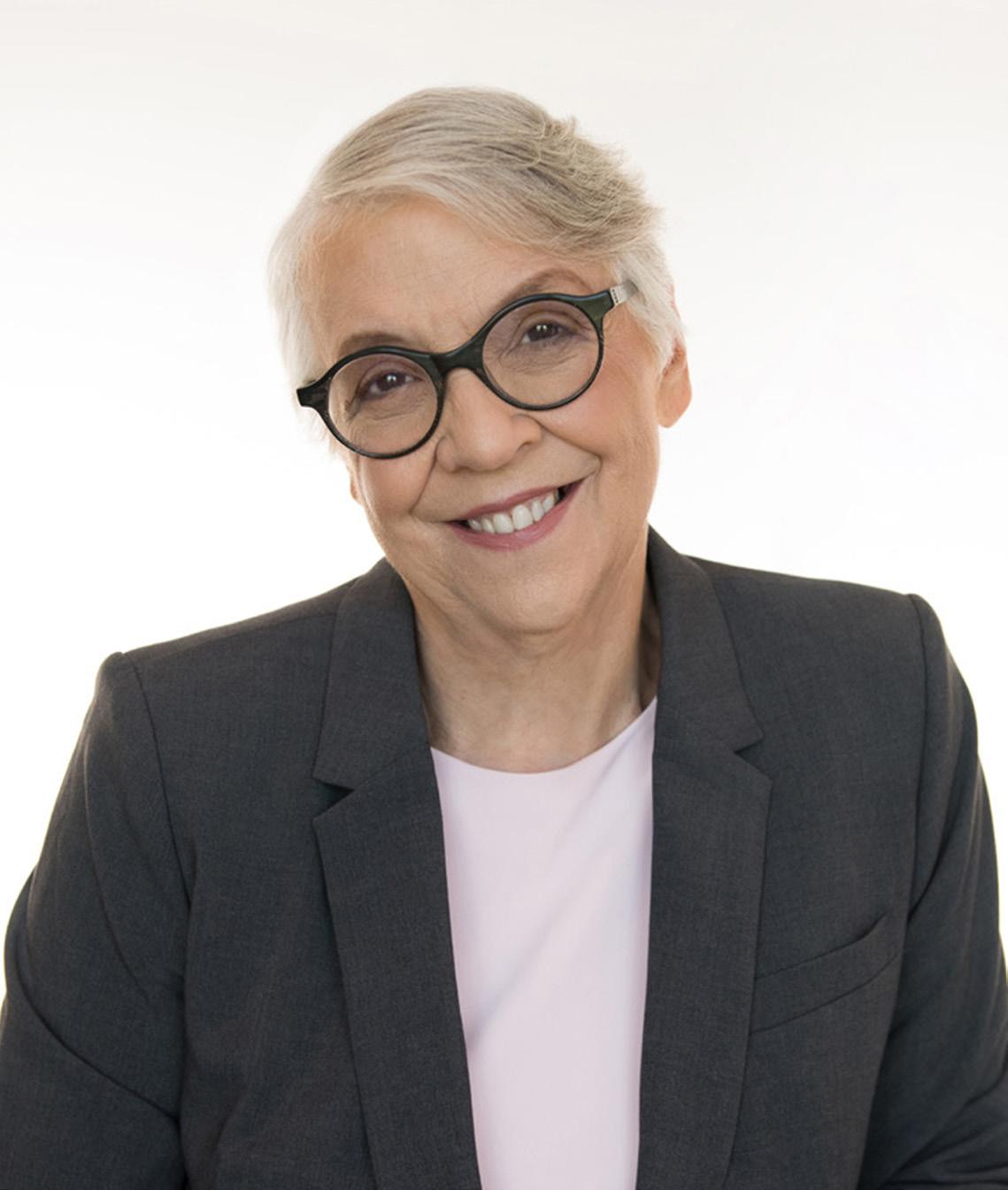
Lou Ness served in the Army for two years before she was “dismissed” – but not for any wrongdoing.
Lou served during the height of the Vietnam War when women were still part of the Women’s Army Corps (WAC): they weren’t allowed to qualify with a rifle, they did basic training separate from men and, unless they had a specialized skill – like nursing – they weren’t allowed into combat zones.
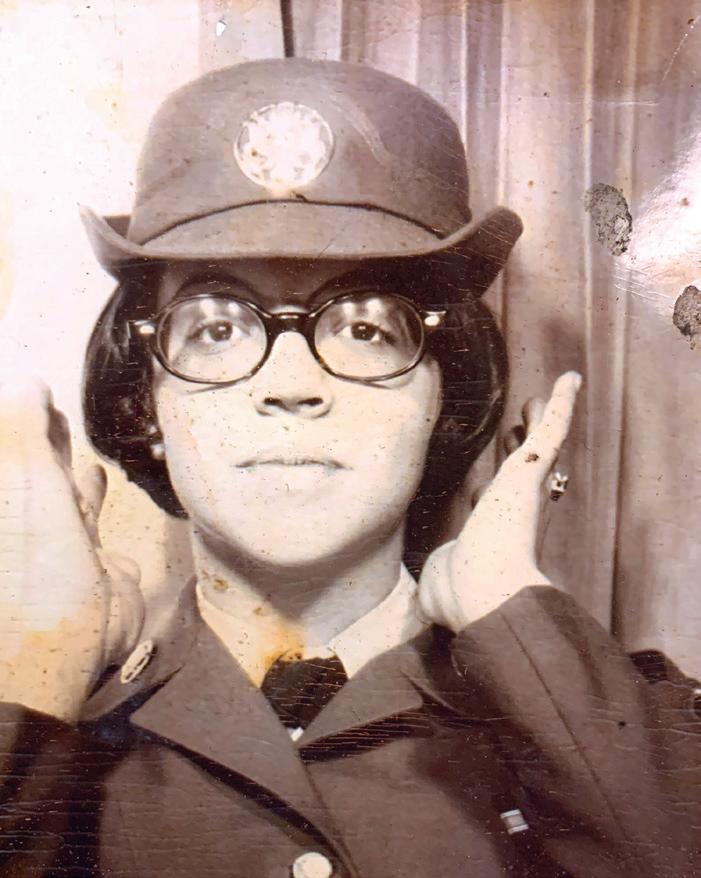
“We never wore fatigues – we weren’t allowed to,” Lou recalls. “We did physically therapy drills, but we wore skirts. We had cotton PTs, they were called. We had shorts for underneath them, but you never went out in pants. Ever.”
And if a woman got pregnant, she was discharged.
Lou entered the Army at 18, got married, got pregnant, and was out after two years – but those two years were very formulative.
“It takes something to get through military service. It’s not a cakewalk,” she says. “I learned discipline, which had been severely lacking. I didn’t like to follow orders. I’m a little like that today, only much more civilized. But they absolutely can teach you to keep your mouth closed and to follow through with a promise – and those are lessons that have held me up in my life.”
She used those ideals to develop her own corporate training business, Forward Effect, which she’s run for decades; when she formerly served as executive director of Turning Point, a battered women’s shelter in McHenry County; and when she formerly served on State Representative Lauren Underwood’s (D-IL) veteran commission.
Currently, she uses those ideals serving on the McHenry County Board.
“When I ran for office, I would say to people, our job is to represent the common good, the middle of the road,” she says. “The highest value is serving the common good of our community. That gets reinforced in our work as a military unit, that we care about our fellow soldiers.”
In May, Lou became the first female commander of Woodstock American Legion Post 412, a position she believes is another way to serve.
“My job as commander is to take care of the members in my post as a leader; to be honorable and respectful and hold people accountable; and to honor all veterans, no matter how short or how long they served,” she says. “You showed up, you stood up, you took the oath, and that matters to me.”
Ericka Schork saw a commercial for the Marine Corps and thought, “That looks awesome.”
“I just loved everything about the way they carried themselves,” she says. “Come to find, it’s because they have higher standards for everything: physical fitness, the way you have to dress, the regulations on your hair. It could be stressful, but at the same time, I really liked it.”
Like many veterans, Ericka can name multiple positive and multiple negative experiences from her time in the service.
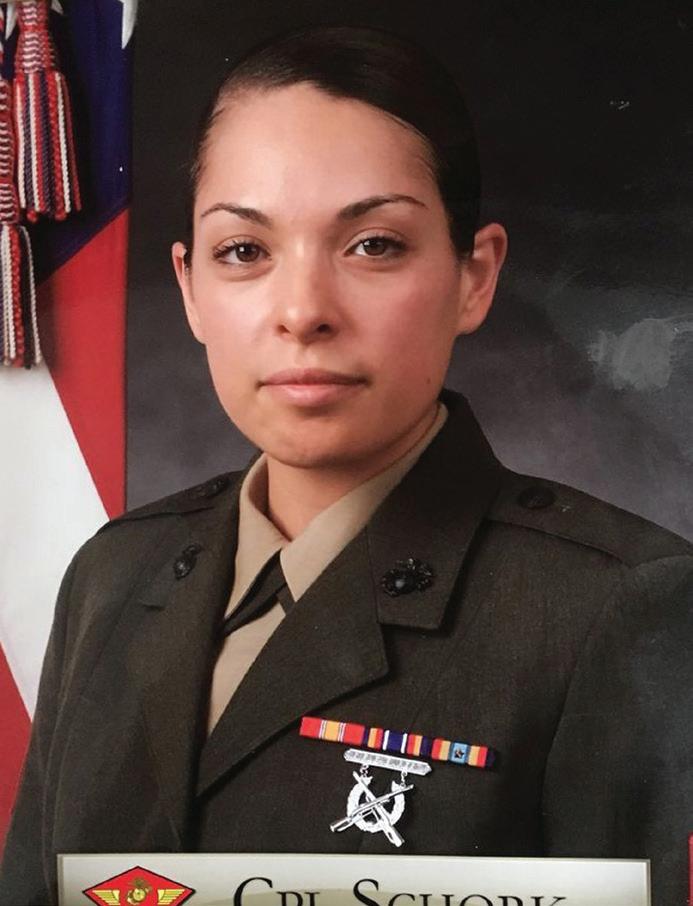
But she chooses to focus on the lessons that have pushed her forward, not on the memories that could hold her back.
“In anything in life, I’ve learned there are going to be negatives and positives, and I don’t mind talking about both,” she says. “On the positive side, [I learned] the ability to endure … it made me more grateful and understanding of my surroundings, and [I learned] to not to complain about my circumstances, but to try to change them.”
She also developed a hard work ethic, and the confidence she gained during her service – fueled by activities such as rifle qualifications, in which she excelled – sparked entrepreneurship. She now owns a cleaning business and online yoga business.

Branch: Marine Corps, 2011 - 2015


Rank: Corporal
Home: Marengo
Age: 34
“I liked the expectations and the professionalism of the Marine Corps, and it definitely carried over into communicating to people [that I believe] in myself,” Ericka says. “People listen to what I have to say. [If I say], ‘I want to do this for a job,’ people listen because I’m confident in what I want to do … . Before I joined the Marine Corps, I had the drive, but there’s something when you push yourself past your physical and mental capability, you’re going to either break down and become weaker and stay that way, or you become stronger.”
While she did gain confidence, she didn’t allow that confidence to spill over into arrogance.
“One of the most important things I realized is, America, and every country, [has] so many systems,” she says. “I was a tiny little piece of a huge, larger picture … and I did find more respect for America itself, because the military is part of the glue that holds it together.”
Military service – from boot camp to separation – is similar to Ericka’s yoga business.
“I learned to use my mind to control my life outcomes –and that’s what I teach in my yoga classes.”
Robin Waltrip served five years of active-duty Army as a heavy equipment operator before getting pregnant with her first child and opting to leave the service.
“I was out for two months, and I was just dying to get back,” she says. “I missed it, which was really surprising to me. I told my husband, and he looked at me and said, ‘Go for it.’ So, I was in the reserve the rest of the time.”
Robin’s 22-year career was full of changes. She entered as a WAC (Women’s Army Corps) when women weren’t taught to fire a weapon, read a map or administer First Aid. But just as the Vietnam War changed warfare tactics, so did it change the expectations of U.S. female soldiers.
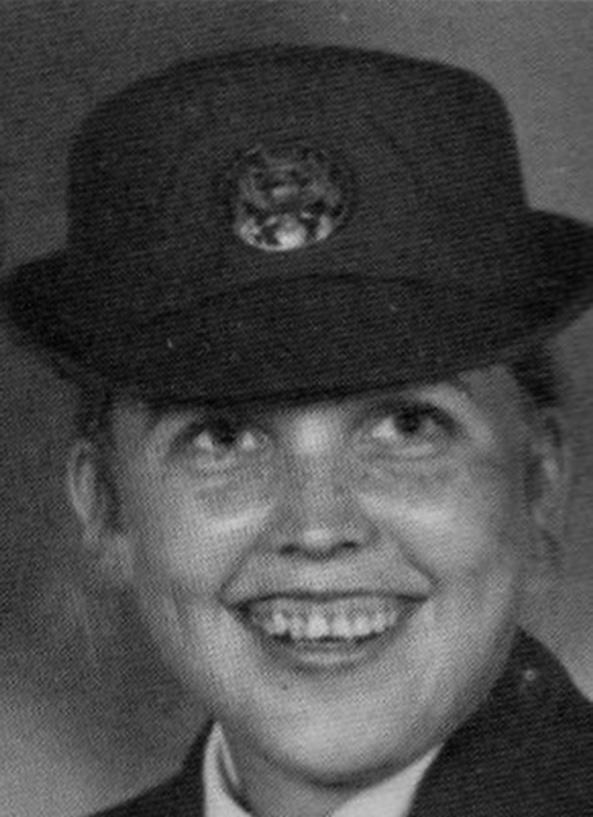
“A helicopter [was] heading for a firebase, and there were three nurses in it,” she recalls. “They were shot down by the Viet Cong, and the pilot and copilot didn’t make it. The females were 100 yards from friendlies, but they walked in the opposite direction because they didn’t know how to read a map. They found them days later, tortured … . They thought, ‘they’re just nurses.’ That was the reason for allowing females to [learn survival skills].”
Branch: Army, 1976 - 2004
Rank: Drill Instructor Sergeant First Class, E-7

Home: Island Lake
Age: 70
Once women were placed on a more equal footing as men, Robin was able to prove that she was just as tough as the men she was training.
“When I went to become a drill sergeant, the guys were laughing, saying, ‘You’ll never make it,’” she says. “I was a talker, and I smile a lot, and I giggle a lot, but when it’s time to do my job, I do it. They thought I was too sweet. But we [women] take our job seriously.”
Robin thinks women in the military have proven their resiliency.
“You give us a challenge, we might not get that challenge done quite like a man does, but we’ll get that challenge done, and sometimes it’s even better,” she says. “We can’t do some of the things men do because of strength, so we have to come up with different ways. Females are adaptive, compassionate, strong and, given a challenge, we will meet it head on.”
Robin, a recent widow, has three sons and enjoys spending time with other veterans at Veterans Path to Hope.
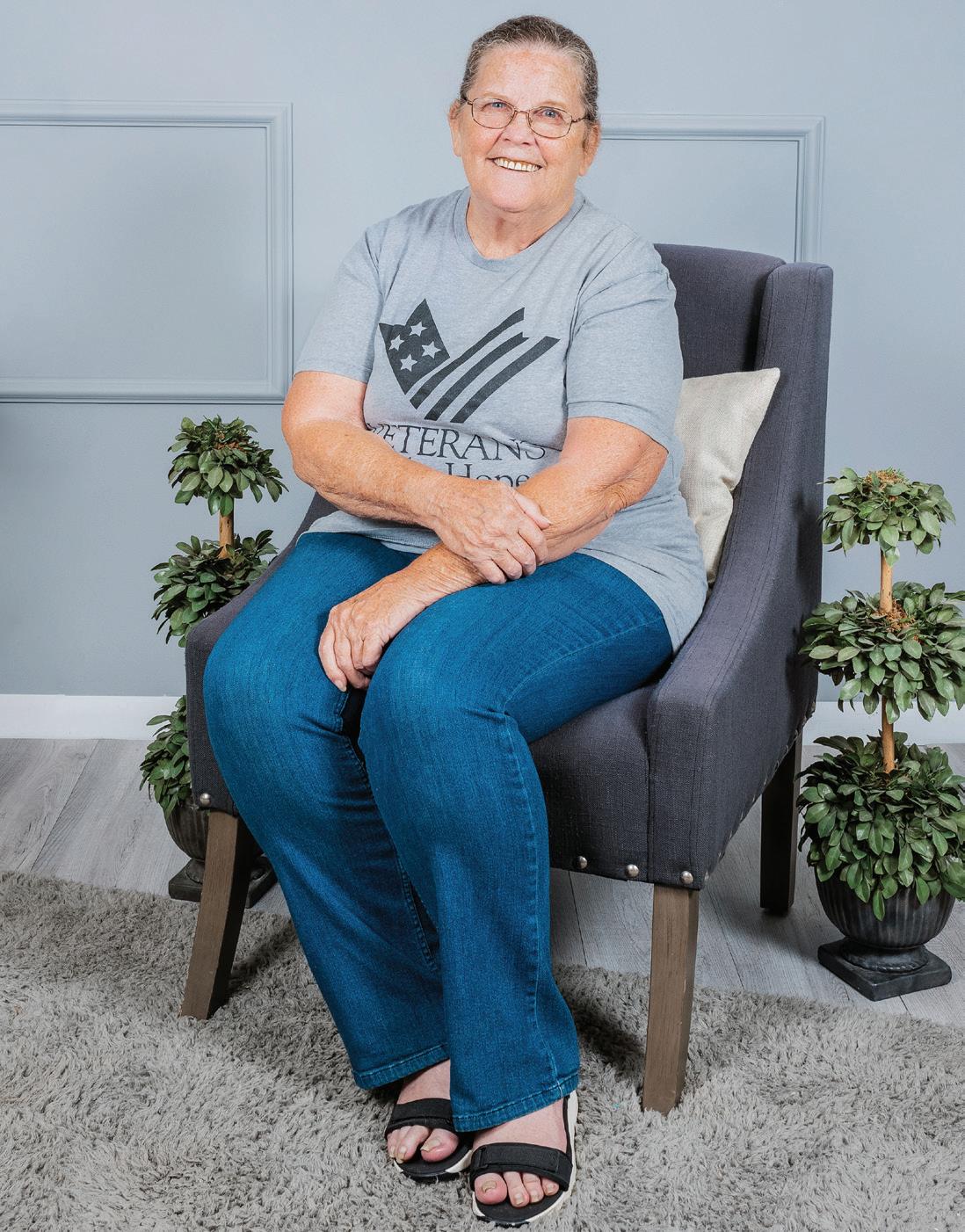
Branch:
Naval Reserve, 1941 - 1944

Rank:
Pharmacist Mate, 3rd Class
Home: Crystal Lake
Age: 101 (on Sept. 29)
It’s funny the experiences you remember from your youth.
Lorraine Egan remembers beans for breakfast on Saturday mornings.
The centenarian was one of the first few hundred WAVES (Women Accepted for Volunteer Emergency Service) of the newly created Women’s Naval Reserve during WWII. And though she stood barely 5 feet tall, she was always the first in the chow line – especially on Saturdays, when they served beans for the morning meal.
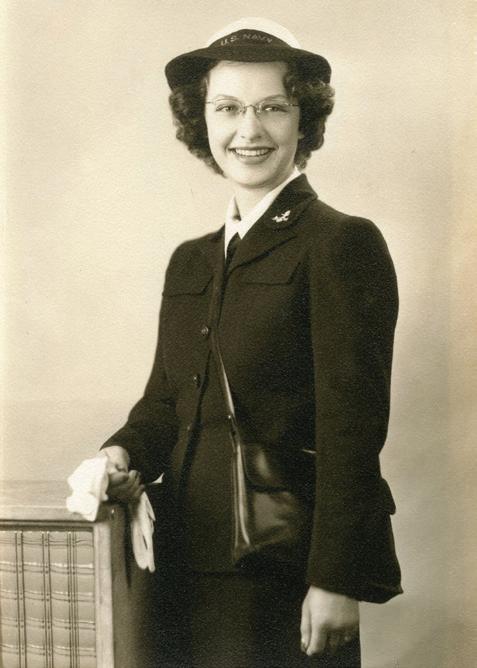
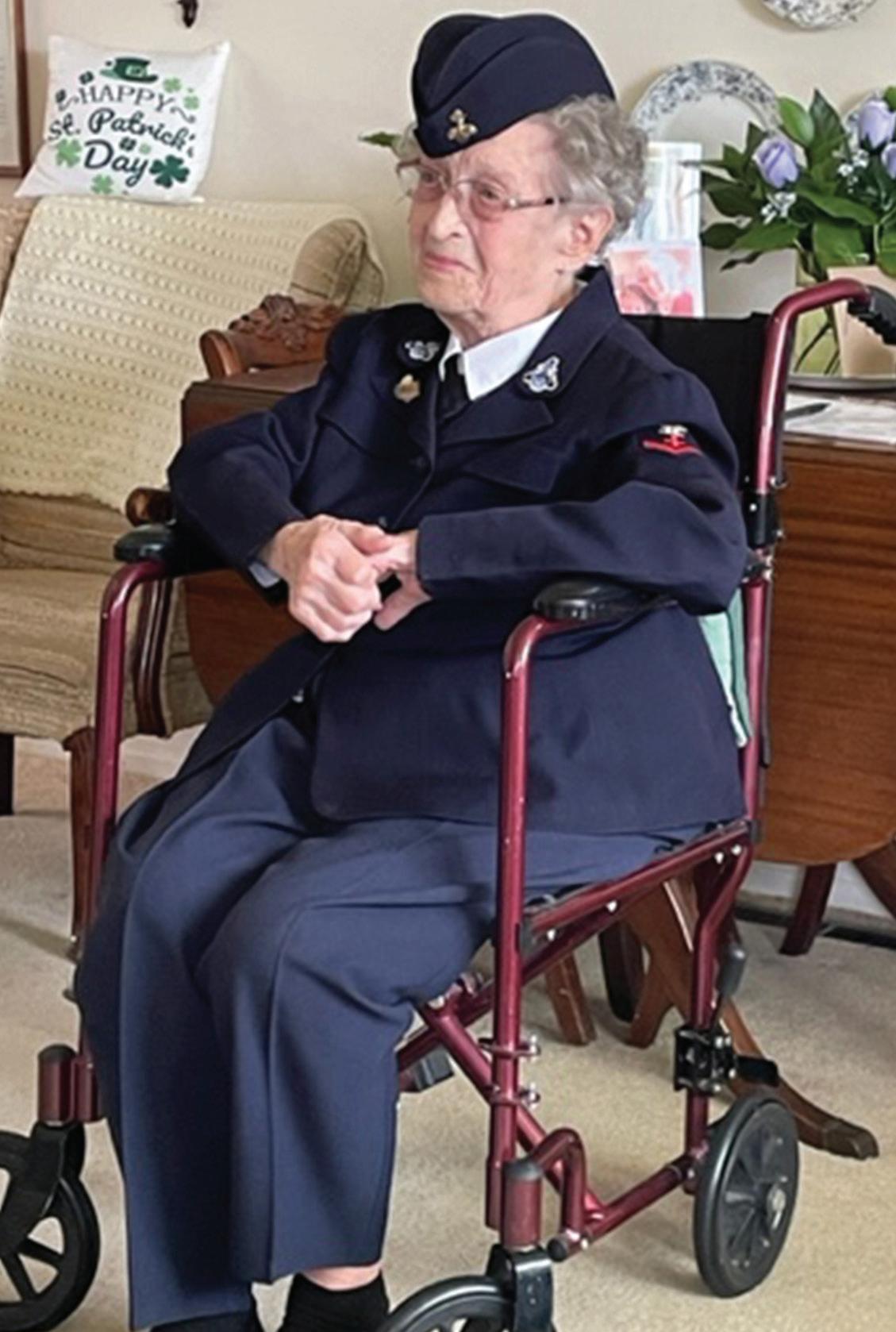
Lorraine was on a date when she heard the news that Pearl Harbor had been bombed, and she told her friends, “I’m going to Chicago on Monday, and I’m going to enlist,” she remembers.
“I just wanted to be a part of it,” she says. “So, I went into Chicago to join the Navy. I asked to be in the hospital corps … and I went to Great Lakes to learn the system, how it was done. We learned to give shots and deliver babies and surgeries – the whole works.”
Lorraine had always wanted to be a nurse, but money was tight.
“I didn’t have the money to go be a nurse then – it was during the Depression years – so this was one way of getting it,” she says.
Like many WAVES, she completed her basic training on a college campus – Hunter College in New York – so she’s proud to say she went to college.
She also spent time serving at Camp Lejeune, a Marine base in North Carolina.
“I did everything at that hospital that you could possible think of,” she says.
She soon married, and once she became pregnant, she was discharged from the Navy. She stayed home to raise her three children, but later utilized her nursing skills with the McHenry County Department of Health, visiting people who needed assistance in their homes.
It wasn’t easy to join the military as a woman in WWII, Lorraine says.
“They didn’t like the WAVES,” she says of her male counterparts. “We were interrupting them. Women belonged at home. ‘What are these women doing here?’ They resented us at first … but we proved them wrong.”
To this day, Lorraine is extremely proud of her service.
“I loved every bit of it – the marching, the whole bit,” she says. “I think it’s the best thing in the world because you learn discipline; you get good, true friends; and three, square meals. Big breakfasts … good thing I like beans!”
Thank you to all participants!
More information can be found on the William Chandler Peterson American Legion Post 171 website: www.LegionCrystalLake171.org.
